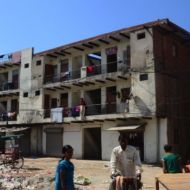Nairobi’s Rent Collectors Find Themselves Stuck Between Two Warring Sides

In neighborhoods like Kawangware, rent agents play the middlemen in a sometimes tense standoff between tenants and landlords. Photo credit: Sam Sturgis
Musa Karanja weaves through the winding rows of small, tightly packed homes, and almost with a sense of guilt, knocks on the front doors of the sixty shanties that fall under his responsibility.
Either because the nearby mosque’s megaphoned call to prayer is drowning out his knocking — or, more likely, because the residents know that he’s there to collect money — very few open their doors for Musa.
“It’s just hunting,” the father of two explains. “Hunting for people and their money.”
The housing crisis engulfing Nairobi’s informal settlements – including the sprawling Kawangware neighborhood where Musa lives and works – is nothing new. When Kenya gained independence in 1963, a flood of rural migrants began finding their way to a Kenyan capital that was unprepared and under-planned for dramatic population growth. Five decades later, issues around housing and land rights continue to plague the capital city, and slum residents are fighting back against their informal status.

Photo credit: Sam Sturgis
Just this past September, for example, a number of the city’s informal settlers filed a legal action suit against their landowners, arguing that the law stipulates that tenants are, in fact, the legal owners of the land. According to the Limitations of Actions Act, commercial land – where Nairobi slums have typically been erected – must be developed within 24 months of it being acquired, including “the construction of the drainage system.” Nevertheless, beyond sewage systems, these neighborhoods are usually without proper infrastructure, education facilities or security provisions.
The end result? A housing issue that is largely seen as a battle between two opponents: Tenants, typically viewed as marginalized and lacking basic rights, versus opportunistic landlords who take advantage of a population desperate for housing.
Often overlooked in the struggle, however, are the people stuck in the middle: the informal “rent agents.”
Such agents, like Musa Karanja, also reside in informal neighborhoods, yet are highly dependent upon the commissions they earn by collecting rent on behalf of the landlords. “The issue is to try and please both sides,” says Musa, stressing that if he doesn’t hand over 15,000 Kenyan shillings ($175 USD) to the landlords each month, they’ll find someone else who can. “You wake up today and everything is okay, but you wake up tomorrow and my commission has been blocked,” he explains glumly.
Musa relies on the informal residents of this Kawangware neighborhood to make ends meet. It’s a truly unusual enclave compared to the rest of the predominately Christian Kawangware; amplified calls to prayer ring out from makeshift mosques, and along the adjacent river one typically finds women washing burqas and Islamic gowns instead of English soccer jerseys.
As is the case with most Nairobi slums, however, the neighborhood exists in a constant state of uncertainty. Consistent sources of income are rare. And while it’s well known that rent agents like Musa will be coming at the end of each month, informal tenants – occupying the space after nothing more than a verbal agreement – sometimes see little reason to hand over what little money they have rather to a man who doesn’t even own their home.
“During the election people just kept promising me, ‘Tomorrow…tomorrow…tomorrow,‘” says Musa. Plagued by fears of electoral violence and the possibility that they might be forced to evacuate, informal residents saw little to gain in paying him until they knew how things were going to shake out. Yet while tenants can procrastinate in paying the rent, the same doesn’t hold true for the rent agent himself.
“I’ve actually used my own money when some of them [the tenants] could not pay in time,” he says. Doing so keeps the tenants free from eviction, but also lessens the chance that the landlords he works for will replace him with another rent agent.
Irene Karanja (no relation to Musa) has worked extensively over the years to streamline the complex set of rules and customs that govern Nairobi’s informal housing sector. As Executive Director of the Muungano Support Trust, a department within the Kenyan Slum Dwellers Federation, Irene and her staff have spearheaded both policy initiatives and legal challenges to limit the power that landlords hold.
“There’s so much uncertainty pertaining to the rent sector,” she says, adding that it’s often government officials and wealthy power brokers who own the deeds to Nairobi’s informal housing structures. And informal tenants are often ill-informed about who the rent agents are. “They (the rent agents) struggle because they’re from the community as well,” she says, emphasizing that agents are subject to the same economic and social challenges that any informal settler faces.
“You know, we have a saying here,” Musa tells me. “Hakuna kizuri kutoka vitu vibaya.” Loosely translated, it means, “Nothing good comes from bad things.”









